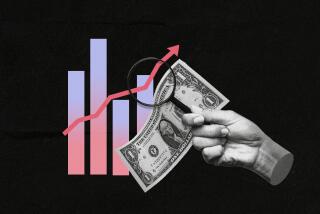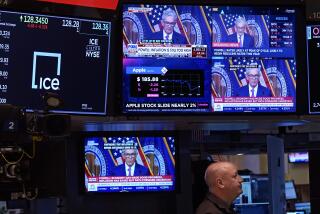U.S. household wealth fell 2.8% in second quarter, Fed says
- Share via
Household wealth in the U.S. fell 2.8% in the second quarter as stock prices were depressed by the European debt crisis, marking a setback for Americans’ efforts to repair finances battered by the recession.
Net worth for households and nonprofit groups declined $1.5 trillion to $53.5 trillion, the Federal Reserve said Friday. The decline was the first since March 2009.
The Standard & Poor’s 500 index dropped 12% during the three months that ended June 30, erasing gains from the previous quarter. Although stock indexes have climbed this quarter, renewed signs of weakness in housing and unemployment near a 26-year high may prompt Americans to increase their savings, holding back the economic recovery.
“Households are being very frugal in what they spend and allocating more of their income to paying off debt,” said Stephen Stanley, chief economist at Pierpont Securities in Stamford, Conn. “Over time, consumers need to work themselves into a better financial position, and that’s not going to happen overnight.”
The decline in wealth wiped out the first quarter’s $1.4-trillion gain, leaving households 19% short of the $65.9-trillion peak in the second quarter of 2007, before the recession began. Net worth bottomed at $48.3 trillion in the first quarter of 2009, when the economy contracted at a 4.9% annual pace.
Confidence among U.S. consumers unexpectedly fell this month to a one-year low, according to a separate report Friday.
The Thomson Reuters/University of Michigan preliminary index of consumer sentiment dropped to 66.6 after a reading of 68.9 in August, the group said. Economists had forecast that the measure would rise to 70.
The cost of living in the U.S. climbed in August for a second month as energy and food prices increased, while other goods and services showed little change.
The consumer price index rose 0.3% for a second month, figures from the Labor Department showed Friday. Excluding volatile food and fuel costs, the so-called core rate was unchanged, compared with a projected gain of 0.1%, the median forecast in a Bloomberg News survey.
More to Read
Inside the business of entertainment
The Wide Shot brings you news, analysis and insights on everything from streaming wars to production — and what it all means for the future.
You may occasionally receive promotional content from the Los Angeles Times.










